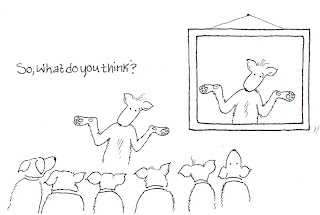
My wife’s favorite art teacher once gave this advice to her students when they were about to show their work for critique: “Remember—it’s not you hanging up there on the wall.”
At the time I heard this advice as the protection that it was: if an audience doesn’t like the work, it doesn’t mean they don’t like you. But the flip side of this, of course, is that if the audience does like the work, it doesn’t mean that they like you either. Many an artist, I think—whether writer, or painter, or chef—has decided quietly in his or her heart to go ahead and hang themselves on the wall anyway and risk the arrows of criticism if they can reap the flowers of praise. This is a mistake. It is a mistake because an artist that makes this choice subjects himself to constant and unnecessary punishment (because there is never a shortage of criticism) for a reward that will ultimately never arrive: You are always the same thing you were before the praise as after.
You are not your work. You cannot be. Though it is romantic to imagine your soul being poured into the cup of your novel and served to the world, this notion supposes your soul could ever be anywhere but one place. All your work, no matter how dear to you, is just an idea. It is not you. You are you.
If you need any convincing, merely consult whatever you have written recently. How many words did you change? How many sentences did you remove? How many characters did you silence? Each of these changes were thoughts you committed to page. Did you survive the changes unscathed? Why, yes you did. Yet every word or sentence you removed or rewrote was no more or less you than what you finally hand to a writing partner or an agent. Those “finished” pieces were just ideas you wished to share.
I grant you, certain ideas are particularly important to each of us—and as well they should be. Ideally, we are driven to write what we write. Ideally, we edit and re-edit what he have written precisely because what we have to say means so much to us. Yet even these great idea gifts, the ones that keep us up at night or locked at our desk for hours, are still only that—ideas. And tomorrow, when you have finished the idea, when you have it just as you like it, the idea will be completed, and you will have moved on, already in search of that next burning thought.
And if you think putting this distance between you—the You of you, that is, the You who thinks the thoughts—if you think allowing this distance between you and your work will somehow strip the work of its intensity, I say, think again. It is too much to ask of a work of art to carry the burden of anyone’s soul. Instead, this distance will set it free.
Because every idea is and deserves to be subject to debate or correction. Beethoven’s 9th is too long; sometimes Shakespeare is too hard to understand; Good Fellas can be too violent. On it will go. That is the nature of all ideas. They are like some of the things ideas become. The record player gives way to the CD, the letter to the email. On it will go. But don’t worry about it. Don’t worry that every idea will be debated and corrected. Don’t worry that even Beethoven’s symphonies might be too long and Scorcese’s movies too violent. The ninth symphony and Hamlet were just ideas in the end—just like your ideas—and in the end no mere idea, no book, no poem, no recipe, no invention, no movie, no kiss will ever be what you have been since the day you were born and will be until the day you will die—perfect

2 comments:
Oh I loved it! It made me cry!
I stumbled across your blog while I was googling "le mot juste," and I found myself neglecting my work while I read more and more. I love your insight (and your points about le mot juste were well taken, though I've always loved the ideal of that perfect work. Le sigh). Thanks for sharing!
-Jess
Post a Comment